The third and final school semester (January to March) began in Seoul in late January 1943, and the Keijo Nippo news cameramen took photos of student life from many different angles as they started school. Some scenes look ordinary enough: students walking to school, boys practicing Kendo in the cold mornings, schoolgirls working on science projects, high school girls ice skating in the old palace grounds. But look more closely, and you can see some disturbing scenes and elements too - the wartime militaristic propaganda enforced by mandatory visits to Shinto Shrines and celebrations of the Flag of the Rising Sun.
(Translation)
Gyeongseong Ilbo (Keijo Nippo) January 16, 1943
We won't be defeated by the cold!
Dashing young kendo athletes rampage during a cold morning practice session
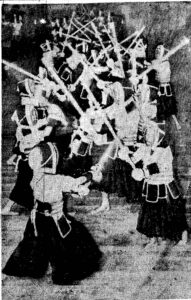
Spiritedly shouting "Omen!" and "Okote," the youthful kendo athletes valiantly trained barefoot from 7:00 a.m. in an extremely cold morning. Here at Seoul Migeun-dong National School, 100 boys in the fifth and sixth grades were selected to participate in a martial arts cold practice session every morning from 7:00 to 8:00 a.m. at the school's auditorium from January 15th to January 20th. On the first day of training, the principal, Mr. Terada, the male school staff, and the children arrived at the school on time.
After the national worship ritual, the students were divided into groups and began sparring, full of energy. After the first day of practice, the students said, "It felt so good! It was cold, but that was nothing when you consider what the soldiers protecting the northern borders have to go through. Studying martial arts like this will help a great deal when we become soldiers," they said, smiling with cheeks like apples. [Photo: Migeun-dong National School students practicing in the cold]
Everyone is in good spirits going to school (article published on January 17)
Today is the beginning of the last school semester
The sounds of strong footsteps of the third school semester are heard at the school gates, which open quickly to the left and right. After a long winter break for training, this group of young students is ready to valiantly fight decisive battles for the final semester of the school year, and they will start school today.
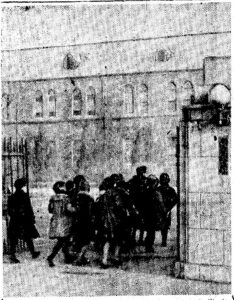
Seoul Teachers College-Affiliated National School, which was the first in all of Korea to end its winter break, will beat the opening drum and rush into the final semester of the school year on January 16th.
After that, the students will move on to the next grade level. The first day of their decisive battle has begun today. [Photo: Students of Seoul Teachers College-Affiliated National School arriving at school after the winter break]
Vigorous young maidens in fierce competition like flying swallows (article published on January 17)
The Ice Competition of Seoul No. 1 Girls' High School, rich with a wartime spirit
The brightness of the silvery ice surface was reflected in the bright blue winter sky. No matter how many degrees below zero it was, the skaters glided over the ice with the lightness of flying swallows.
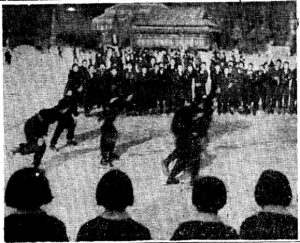
The Seoul No. 1 Girls' High School Ice Competition were held at a special competition venue set up at Chundangji Pond in Changgyeongwon from 9:00 a.m. on January 16, and the competition began with classroom teams paired against each other in relay races, which was a befitting format for a wartime training event for maidens on the home front. The cheerleading squads were stomping on the ice and cheering enthusiastically as the girls engaged in powerful offensive and defensive battles, as if the relay races were establishing an air defense posture. The girls on the home front were cheerful and lively. The competition ended at around 2:00 p.m., the girls having shown off their vigorous spirit which blew away the winter and the cold. [Photo: The Ice Competition]
Well-behaved young children studying science (article published on January 19)
Wartime education at the Women's Teachers School-Affiliated National School
"Why does this propeller turn?" asked a cute first grader with a bowl haircut as she eagerly fiddled with a model airplane, her eyes filled with curiosity.
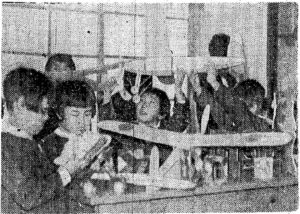
"The propeller spins because there is an elastic rubber band, and the propeller spins as the elastic band unravels. Real airplanes have engines," explained a bigger girl in the sixth grade. On the other side of the room, second grade girls were tinkering with paper tanks and cars, expressing their adorable admiration and gratitude for the Imperial Military Science Corps, which has performed brilliantly in the Greater East Asia War. This group of scientific youngsters consists of students of the National School affiliated with Seoul Women's Teachers School. These are the products of the homework projects that each of them worked on during the recent winter break, twisting their young minds with creativity. These homework projects of one hundred promising 'well-behaved children of science' were set up for display in the school work room.
Among the projects made by the older students were a wooden "charcoal box" and a wooden "book stand", as well as beautiful playing cards featuring '100 patriotic poems' made by sixth graders with all their hearts and souls. Surrounded by the happy children and their works, Mr. Watanabe said,
"These are all works that the students voluntarily created during the winter training period as a result of their scientific education, so to speak. I try to nurture the children's creativity as much as possible. I believe that this kind of scientific training will also help them to become highly qualified mothers of healthy soldiers." [Photo: Students at Seoul Women's Teachers School-Affiliated National School performing science]
We will not lose either (article published on January 20)
Hinode National School students pledge to bless the nation with their academic work
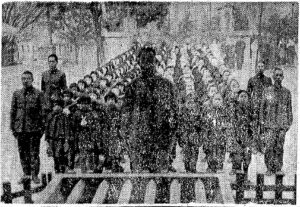
The four warm breezes crossed the pine trees on Mount Namsan. But the shrine head was covered with frozen snow that had fallen some time ago. A group of schoolchildren walked up the stone steps of the shrine head. The city of Seoul was spewing morning smoke as the day's activities got underway to fight decisive battles. The group of schoolchildren lined up in front of the Shinto shrine. The children were beginning their third semester of studies at Seoul Hinode National School on January 19th after their winter break. After the opening ceremony at 9:00 a.m. that day, Principal Etō and three other teachers led the children to Keijō Shrine to worship the shrine's guardian deities.
Bowing deeply before the shrine, they let their Imperial blood surge in their young hearts. They vowed with their adorable voices, "We will study even harder with our strong hearts to defeat the U.S. and Britain! We will not lose to British and American children!" They clapped their cute hands and prayed for the longevity and military success of the Imperial Japanese military. They earnestly vowed to serve on the home front as schoolchildren. [Hinode National School students worshiping at Keijō Shrine]
[Note: This Japanese-language academic paper from Kyushu University indicates that Hinode National School only enrolled ethnic Japanese students and few, if any, ethnic Korean students.]
Banzai to the Flag of the Rising Sun! (article published on January 28)
On this day, when you peek into the Patriotic Kindergarten in Seoul, you can see 285 Japanese and Korean children, some as young as six and some as old as seven, lined up in the bright winter yard, holding the "Rising Sun Flag" in their hands. Principal Asagara said to the children:
"Look everyone! This is the flag of Japan, the strongest country in the world. This flag is used by the soldiers who are fighting in the Great War to defeat the soldiers of the United States and Great Britain. Today is the anniversary day of this flag."
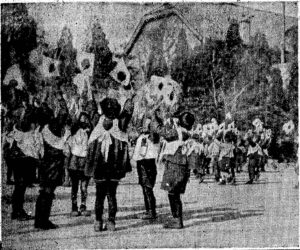
Then the "Hinomaru March" began, followed by the lyrics "the Rising Sun is dyed red on white …" which was performed with great energy and enthusiasm. Then, the children celebrated by shouting "Banzai to the Flag of the Rising Sun!" in a loud voice, led by Principal Asagara. [The Rising Sun Flag celebrations at the Patriotic Kindergarten]
[Note: According to this 1942 brochure from the actual kindergarten, there were a total of 287 students: 176 ethnic Japanese students (61%), 108 ethnic Korean students (38%), 2 Chinese students, and 1 Turkish student.]
Source 1: https://www.archive.org/details/kjnp-1943-01-16
Source 2: https://www.archive.org/details/kjnp-1943-01-17
Source 3: https://www.archive.org/details/kjnp-1943-01-19
Source 4: https://www.archive.org/details/kjnp-1943-01-20
Source 5: https://www.archive.org/details/kjnp-1943-01-28
(Transcription)
京城日報 1943年1月16日
寒さに負けるものか!
朝の寒稽古に颯爽少年剣士の乱撃ぶり
『オメン!』 『オコテ!』裂帛の気合も若々しく少年剣士は、凛冽の寒朝、午前七時からその素足も健気に錬武する。ここ京城渼洞国民学校では同校五、六年生男子百名を選抜して十五日から二十日まで毎朝午前七時より同八時まで講堂を道場として武道寒稽古を行っている。その初日寺田校長初め男子職員、児童達は定刻に参集。
国民儀礼ののち、各組に分れて元気一ぱい剣道開始。火花を散らして天晴れ銃後学童の意気を見せ猛稽古を行ったが、その初日を終えた児童達は、「とても気持ちがよいのです。寒さですが、北の護りの兵隊さん方のことを思えばなんでもありません。こうした武道の勉強が僕らが兵隊となるときの大きい役割をつとめることでしょう」と林檎の様な頬をさせてニッコリと笑う。【写真=渼洞国民学校生徒の寒稽古】
みんな元気に登校 (1月17日)
きょう最終学期始め
さっと左右にひらいた校門へ、第三学期の逞しい足音も勇ましい。鍛錬の冬休みを終えた少国民の一群が決戦学期への構えも雄々しく愈よきょうから登校開始だ。
全鮮で一番早く休みを切り上げた京城師範附属国民学校では十六日から始業の太鼓を打ち響かせて最終学期への驀進だ。
これが過ぎれば進学だ。いよいよ僕らの決戦第一日もきょうから始まったのだ。【写真=冬休みあけて登校する京師附校の児童達】
溌剌乙女ら”飛燕”の熱戦 (1月17日)
戦時色も豊かに第一高女の氷上大会
まっ青な冬空に映ゆる銀盤の輝かしさ。その上を零下何度、何十度あろうと物かは身を飛燕の軽やかさで滑る。
京城第一高女の氷上大会は、十六日午前九時から昌慶苑春塘池の特設競技場で開催されたが、競技は各組対抗継走に幕を切っておとした。継ぐ競技種目も戦時下銃後乙女の錬成にふさわしく時局色を盛った氷上行進。防空態勢を整える聯絡競争などと力強い攻防戦を展開すれば、応援団は氷を踏み鳴らしての熱援。まこと銃後の女生徒達は明朗快活。冬も、寒さも吹き飛ばした溌剌たる意気を誇示して午後二時ごろ終了した。【写真=氷上大会】
科学するヨイコドモ (1月19日)
女師附属国民校の決戦教育
”このプロペラはどうして廻るの?”一年生の可愛いおかっぱ頭が模型飛行機を熱心にいじくりながら好奇心にみちた目差しで尋ねる。
”それはね、弾力性のあるゴム紐があってプロペラを廻してよれたゴム紐がほどけるため廻るのよ。本物の飛行機は発動機”と六年生らしい大きいおかっぱの嬢ちゃんが教えているのだ。その側では二年生のお嬢ちゃんたちが紙の戦車や自動車をいじりながら大東亜戦で赫々たる武勲を樹てている皇軍科学兵団への可憐な思慕と感謝を寄せている。この科学する幼い群は京城女子師範学校附属国民学校の生徒たちで、先ほどの冬季休暇中、各自が幼い頭をひねて創った家庭作業の収穫で、それを同校工作室に陳列して全校児童百名が決戦下”科学するヨイコドモ”の頼母しさを見せているのだ。
高等科の生徒たちが作った木工細工の『炭箱』、『本立』そうかと思えば六年生の丹精をこめての作品、綺麗な”愛国百人一首”もある。このほほ笑ましい作品と児童の中に埋まって渡辺主事は語る。
「これはみんな生徒たちが自発的に冬季鍛錬期間を利用して作ったもので、謂わば科学教育の成果です。私の方ではできるだけ子供達の創作意欲を育んでやりたいと努めているのです。こうした科学的錬成も招来健兵の母として高い素質となることを信じます。【写真=科学する女師附属国民校生】
僕らも負けずに (1月20日)
日出国民校生学業報国の誓い
四温の風が南山の松を渡る。でも社頭にはいつの日にか降った雪が凍ってついている。学童の一隊がその社頭の石段を上ってゆく。京城の街は朝煙を上げて決戦今日の活動に入っている。学童の一隊は神前に整列した。決戦態勢下に学びながらすくすく伸びて、皇国の輝かしい将来を担って起つ小国民の意気を見せて京城日出国民学校では冬休みも明けた十九日から第三学期の学業をはじめたが、この日午前九時児童たちは始業式後江藤校長先生ほか三名の先生達に引率せられ、氏神の京城神社へ参拝。
神前に深く頭を垂れて幼い胸に沸り上る皇国の血潮を波たたせて”米英撃滅の強い心で僕らも一層勉強します。米英の子供に負けませぬ”可憐な誓いをたて、更に可愛い手で拍手を打ち皇軍の武運長久を祈って学童としての銃後奉公を固く固く誓った。【京城神社参拝の日出国民校生】
日の丸の旗バンザイ!! (1月28日)
この日京城府内愛国幼稚園を覗けばまだ六つ、七つといういたいけない園児達が内鮮合せて二百八十五名、手に手に”日の丸の旗”を持って冬の明るい園庭に並んでいる。園長の麻柄先生が、
「みなさん、これは世界で一ばん強い日本のお旗ですね。この旗が今大戦争をしていらっしゃる兵隊さんと一緒にアメリカやイギリスの兵を攻めたいらげているのです。今日はこの旗の記念日です」とのお話。
ついで”日の丸行進”が始まった。それから”白地に赤く日の丸染めて...”の遊戯が元気一杯に行われて麻柄先生の発声で”日の丸の旗バンザイ”と声高らかに祝われた。【愛国幼稚園の日の丸遊戯】








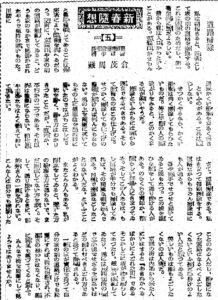
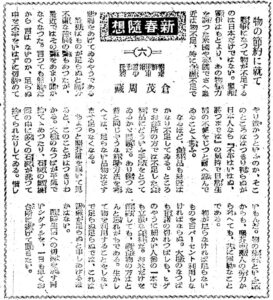
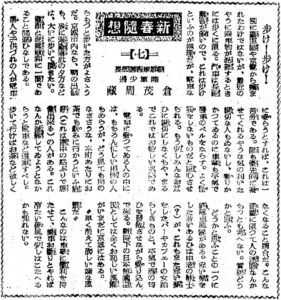
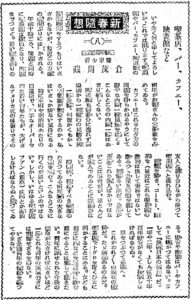
.jpg)
.jpg)
.jpg)
.jpg)
.jpg)
.jpg)
.jpg)
.jpg)
.jpg)
.jpg)
.jpg)






